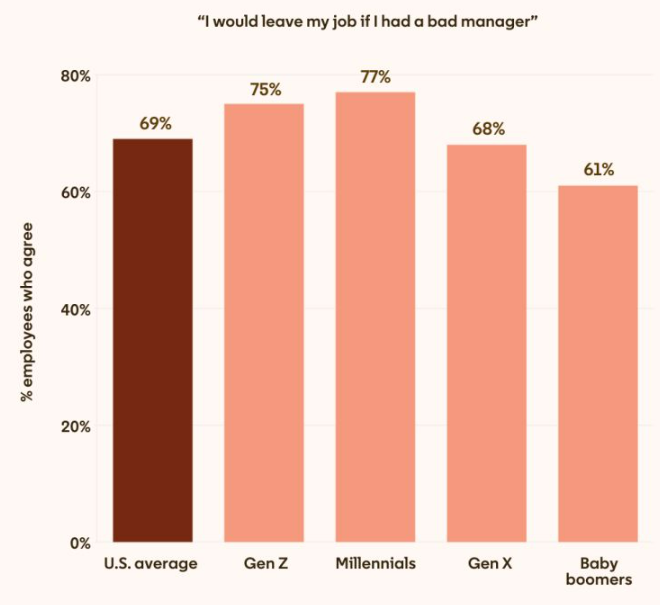In the majority of businesses, there is a significant divide between C-suite and frontline employees. Senior leaders may be the ones responsible for blueprinting company culture, but it’s line managers who bridge the gap and ensure this vision reaches and effectively translates to non-managerial employees.
Due to their closeness with both “higher-ups” and “lower-downs”, line managers directly influence the success of wellbeing and safety practices, often being the determining factor in whether they thrive or fail.
In this article, we explore the crucial role of line managers in nurturing employee wellbeing and a strong workplace safety culture.
What is a line manager – and what are their responsibilities?
A line manager is the direct link between an organization’s leadership and its employees.
Unlike senior executives who focus on long-term strategy, line managers work closely with individuals and teams, ensuring that day-to-day operations run smoothly. They are the “hands-on” leaders, guiding staff, allocating tasks, and making sure goals are achieved.
Their responsibilities can vary depending on the size and type of organization, but typically include:
- Supervising employees – providing guidance, direction, and support in day-to-day work.
- Performance management – setting objectives, giving feedback, and conducting appraisals.
- Team wellbeing – monitoring workloads, recognizing signs of stress or burnout, and fostering a positive environment.
- Health and safety oversight – ensuring staff follow policies, identifying risks, and acting quickly to resolve issues.
- Communication – keeping staff informed of organizational changes and relaying feedback upwards.
- Development and training – coaching team members and identifying growth opportunities.
In short, line managers wear many hats. They are part mentor, part coach, part problem-solver, and part role model, making their influence on workplace wellbeing and safety both unavoidable and powerful.
Learn 3 essential steps to improving safety awareness in the workplace.
The role of line managers in protecting worker wellbeing
Perhaps the importance of line managers to employee wellbeing is best outlined by considering the impact of poorly performing line managers.
Gallup research has shown that employees with a bad manager report worse wellbeing levels than those who are unemployed. And according to a 2024 LinkedIn Workforce Confidence Survey, 69% of workers would quit their job if they had a bad manager.

Reviewing a 2015 Gallop poll reveals this is anything but a new trend: even a decade ago, for roughly 50% of adults who left their job, the main reason was “to get away from their manager”.
Another study of more than 3,000 men revealed that working under a poor manager increased the risk of serious cardiac issues by up to 60%. These findings highlight just how deeply management behavior can affect not only morale and engagement, but also physical health.
When managers fail to support their teams, the fallout extends beyond the individual — affecting productivity, retention, and organizational culture. But the reverse is also true. A supportive, well-trained line manager can be a powerful driver of wellbeing.
Let’s now dive into why line managers have such a deep impact on worker wellbeing.
1. They control the flow of work
Line managers are responsible for allocating tasks, setting priorities, and monitoring deadlines. When workloads are managed fairly, employees feel supported and able to perform at their best. But when work is poorly distributed or expectations are unrealistic, stress, burnout, and other mental health issues quickly follow.
Read our Employer’s Guide to Mental Health at Work.
2. They shape the team climate
Every manager sets the tone for their team. A supportive, approachable leader fosters trust and psychological safety, while a critical or dismissive one can create fear and disengagement. This day-to-day climate heavily influences how employees experience their work.
3. They are the first line of support
Because they work so closely with staff, line managers are often the first to notice when someone is struggling. Whether it’s stress, conflict, or personal challenges spilling into work, a manager’s response can determine whether issues escalate or are resolved constructively.
4. They influence work–life balance
A manager’s attitude toward flexibility, time off, and boundaries has a direct impact on wellbeing. Leaders who respect personal time and encourage healthy habits help employees maintain balance, while those who expect constant availability contribute to exhaustion.
5. They connect employees to the bigger picture
Line managers play a key role in communicating organizational goals and values. When they connect everyday tasks to a sense of purpose, employees feel more engaged and motivated. This connection can be a powerful buffer against stress and disengagement.
6. They role-model healthy behaviors
Employees take cues from their managers. When leaders visibly manage stress, take breaks, and respect boundaries, it gives permission for others to do the same. Conversely, if a manager glorifies overwork or ignores their own wellbeing, teams often mirror that behavior.
7. They are the bridge between staff and leadership
Line managers act as the crucial link between frontline employees and senior decision-makers. They can champion their team’s needs, raise concerns before they escalate, and ensure that staff voices are heard. Without this bridge, employees often feel disconnected and undervalued, which erodes wellbeing.
8. They stay connected through regular touchpoints
How often a manager checks in with their team has a direct impact on engagement and wellbeing.
Gallup research shows that the frequency of feedback matters more than whether employees are in the office or working remotely. Regular conversations (whether weekly one-to-ones, team catch-ups, or informal check-ins) help managers understand workloads, spot challenges early, and build stronger relationships. This consistent connection is a simple yet powerful driver of both engagement and wellbeing.
The role of line managers in promoting workplace safety culture
Line managers have enormous influence over how safety is prioritized day to day. When managers cut corners, ignore risks, or fail to respond to concerns, they send an implicit signal that safety isn’t important. Over time, this erodes trust, discourages reporting, and normalizes unsafe practices — often with serious consequences.
Explore our range of Safety Consultancy services.
The reverse is also true. When line managers model safe behaviors, encourage open conversations, and make safety part of routine work, they embed it into the team’s culture.
A study of healthcare facilities in France, for example, found that support from frontline management nurtured a positive outlook on safety in the workplace, while gaps in leadership engagement weakened safety culture overall.
Furthermore, a study examining occupational health and safety (OHS) vulnerability found that employees who lacked supervisor support were significantly more likely to experience physical injuries at work.
Let’s explore the reasons line managers are crucial in strengthening workplace safety culture.
1. They model safe behaviors
Employees take cues from their managers. When line managers consistently follow safety procedures, wear protective equipment, and demonstrate caution, staff are more likely to adopt the same standards.
2. They encourage reporting and transparency
A strong safety culture relies on open communication. Managers who actively invite employees to report hazards or near-misses without fear of blame create an environment where risks are addressed before they escalate.
3. They integrate safety into daily routines
Line managers embed safety checks into workflows, remind teams of protocols, and make safety conversations a regular part of team meetings.
4. They provide timely feedback on risks
Recognizing safe behaviors and addressing unsafe actions promptly reinforces the importance of safety. Constructive feedback helps staff learn and correct mistakes without creating a culture of fear or punishment.
5. They coordinate resources and support
Managers ensure teams have the right tools, staffing, and training to work safely. Even the most committed employees can’t follow procedures effectively if they lack adequate equipment or guidance.
6. They foster accountability and shared ownership
Line managers make safety a team responsibility, not just a managerial task. By involving staff in identifying hazards and developing solutions, they create a sense of shared commitment that strengthens the overall culture.
7. They shape risk perception
Managers influence how seriously teams take potential hazards. By framing risks appropriately, neither downplaying dangers nor causing unnecessary alarm, managers help employees respond effectively and proportionately.
The importance of safety and wellbeing training for effective line management
Many employees step into line management roles because of their technical expertise or an impressive track record delivering as a front-line employee, not necessarily because of their strengths in people leadership and safety.
Without the right training or support, this can leave managers ill-equipped to handle the human side of their role, and the result is often a negative impact on team wellbeing and safety.
At Cardinus, we offer a comprehensive Safety for Line managers eLearning course that equips delegates with the health, safety, and environment knowledge required to nurture a robust safety culture within your organization. See course details.
We also recommend line managers enroll on our Mental Health Awareness eLearning course, designed to help delegates support the mental health and wellbeing of their colleagues. See course details.
And finally, as line management is becoming an increasingly difficult job, with managers often dealing with the same or greater pressures as the teams they look after, consider our Personal Wellbeing course. When line managers know how to look after their own wellbeing, they’re well positioned to understand, communicate with, and support others, leading to a happier, more productive workforce.
Contact Cardinus today to learn more about our training options or discuss how else we can support your people and your business.





